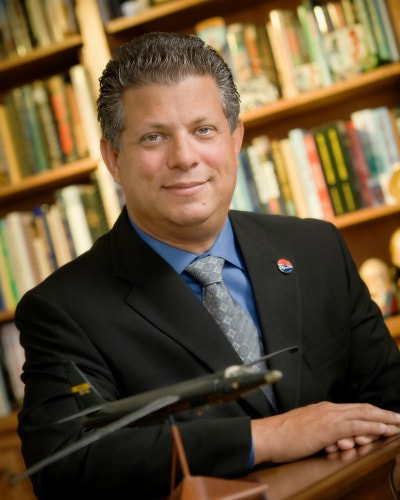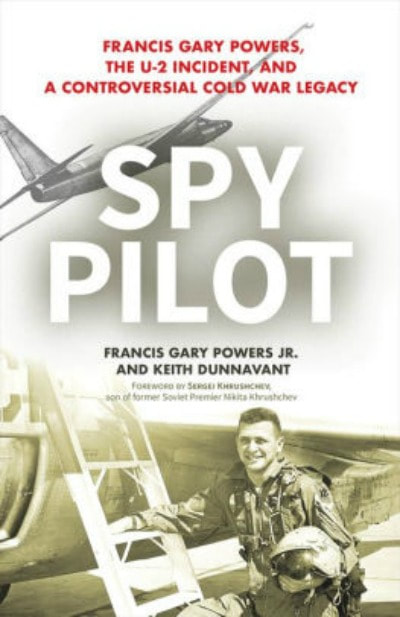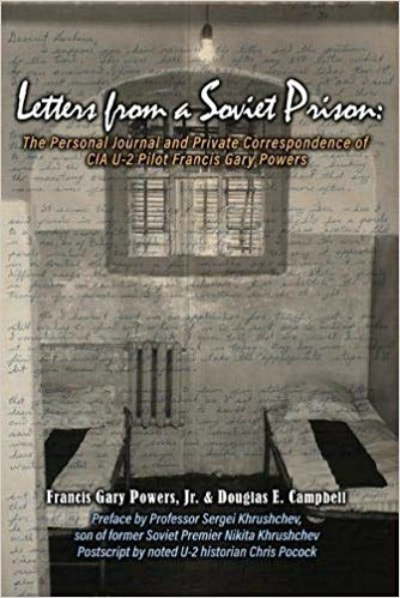Francis Gary Powers Jr.
|
Born June 5, 1965, in Burbank, California, he is the son of Francis Gary and Claudia “Sue” Powers. Gary holds a Bachelor of Arts Degree in Philosophy from California State University, Los Angeles, and a Master’s Degree in Public Administration / Certification in Non-profit Management from George Mason University (GMU), Fairfax, Virginia. He graduated in 2019 with his Master’s Degree in U.S. History from Adams State University, Alamosa, CO.
Gary is the Founder and Chairman Emeritus of The Cold War Museum, a 501(c) (3) charity located at Vint Hill, VA 45 minutes west of Washington, DC. He founded the museum in 1996 to honor Cold War veterans, preserve Cold War history, and educate future generations about this time period. As Chairman of the Presidential Advisory Committee for the Cold War Theme Study he works with the National Park Service and leading Cold War experts to identify historic Cold War sites for commemorating, interpreting, and preservation. In 2015, he consulted for a Steven Spielberg Cold War thriller, Bridge of Spies, about James Donovan who brokered the 1962 spy exchange between KGB spy Rudolph Abel and CIA U-2 pilot Francis Gary Powers, Sr. Gary is the author of Letters from a Soviet Prison and Spy Pilot which both help to dispel the fake news surrounding the U-2 Incident. He is a Board Member of the Strategic Air Command and Aerospace Museum near Omaha, NE and an Honorary Board Member of the International Spy Museum in Washington, DC. Because of his efforts to honor Cold War veterans, the Junior Chamber of Commerce selected him as one of the “Ten Outstanding Young Americans” for 2002. Gary lectures internationally and appears regularly on C-SPAN, the History, Discovery, and A&E Channels. He is married and has one son. |
Spy Pilot: Francis Gary Powers, the U-2 Incident, and a Controversial Cold War Legacy
|
Cold War History
Based on newly available information, the son of famed U-2 pilot Francis Gary Powers presents the facts and dispels misinformation about the Cold War espionage program that his father was part of, and was featured in Steven Spielberg’s Bridge of Spies. One of the most talked-about events of the Cold War was the downing of the American U-2 spy plane piloted by Francis Gary Powers over the Soviet Union on May 1, 1960. The event was recently depicted in the Steven Spielberg movie Bridge of Spies. Powers was captured by the KGB, subjected to a televised show trial, and imprisoned, all of which created an international incident. Soviet authorities eventually released him in exchange for captured Soviet spy Rudolf Abel. On his return to the United States, Powers was exonerated of any wrongdoing while imprisoned in Russia, yet a cloud of controversy lingered until his untimely death in 1977. Now his son, Francis Gary Powers Jr., has written this new account of his father's life based on personal files that have never been previously available. Delving into old audio tapes, the transcript of his father's debriefing by the CIA, other recently declassified documents about the U-2 program, and interviews with his contemporaries, Powers sets the record straight. The result is a fascinating piece of Cold War history. Almost sixty years after the event, this will be the definitive account of a famous Cold War incident, one proving that Francis Gary Powers acted honorably through a trying ordeal in service to his country. |
Letters from a Soviet Prison: The Personal Journal and Private Correspondence of CIA U-2 Pilot Francis Gary Powers
|
Cold War History
My father, Francis Gary Powers, was a CIA U-2 pilot who was shot down in the midst of the Cold War, on May 1, 1960, while flying in Soviet airspace. After his capture, he was tried for espionage and then served nearly two years in a Soviet prison until his eventual release in exchange for Soviet Colonel Rudolf Abel, a senior KGB spy who was caught in the United States in the late 1950s. The two operatives were brought to separate sides of the Glienicker Bridge in Potsdam, Germany, as depicted in Steven Spielberg's motion picture Bridge of Spies, where the exchange took place. While in prison my father kept a personal journal and was allowed to write and receive personal correspondence. In this book is the never-before published journal of my father's thoughts as a Prisoner of War, along with more than 150 personal letters written and received by my father during his captivity. |









